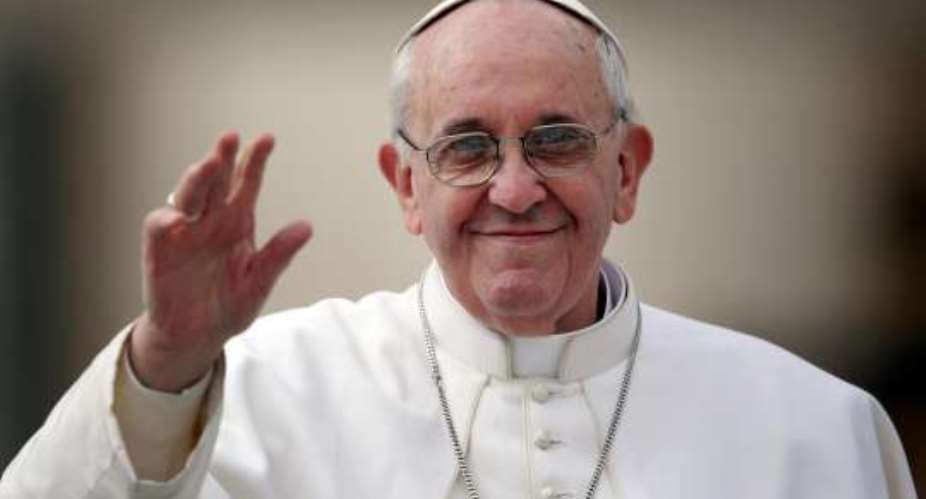Vatican City, ACCRA, APRIL 8 - (dpa/GNA) - The Catholic Church cannot give up its dogmas but should be more understanding towards people, like divorcees, who lead lives that stray from its teachings, Pope Francis said in a key document Friday.
The Amoris Laetitia (Joy of Love in Latin) Apostolic Exhortation is supposed to wrap up a divisive debate on family issues that saw bishops engage in bitter rows during two summits, known as Synods, held at the Vatican in 2014 and 2015.
"While clearly stating the Church's standing, [priests] are to avoid judgements that do not take into account the complexity of various situations" experienced by modern day Catholics, Francis said in the 261-page document.
He acknowledged that "many people feel that the Church's message on marriage and the family does not clearly reflect the preaching and attitudes of Jesus," who "set forth a demanding ideal" but was always ready "to show compassion and closeness" towards sinners.
One of the most contentious issues that the pope's document was due to tackle was the possible softening of a ban on remarried divorcees taking the Holy Communion. The ban is long-standing, often not respected, but still officially in force.
The pontiff said: "The divorced who have entered a new union can find themselves in a variety of situations, which should not be pigeonholed or fit into overly rigid classifications leaving no room for a suitable personal or pastoral discernment."
"The baptized who are divorced and civilly remarried need to be more fully integrated into Christian communities in the variety of ways possible, while avoiding any occasion of scandal" and "need to feel not as excommunicated members of the Church," he added.
The wording backs the compromise solution approved by the bishops' 2015 Synod, allowing case-by-case procedures to determine whether remarried divorcees can take the communion, following a period of penance and guidance from their priest.
Francis was less bold towards homosexuals.
He said they need to be respected and spared from discrimination, but quoted Synod documents saying that "there are absolutely no grounds for considering homosexual unions to be in any way similar or even remotely analogous to God's plan for marriage and family."
The pope pointed out that he was never going to reinvent the wheel of Catholic doctrine.
"Neither the Synod nor this Exhortation could be expected to provide a new set of general rules, canonical in nature and applicable to all cases. What is needed is simply a renewed encouragement to undertake a responsible personal and pastoral discernment of particular cases," he said.
In the exhortation, the pope confirmed the Vatican's traditional opposition to divorce and artificial contraception, and also listed poverty, migration, lack of welfare support, drug abuse, violence against women among the threats to stable family life.
On abortion, he said: "So inalienable [is] the right to life of an innocent child growing in the mother's womb, that no alleged right to one's own body can justify a decision to terminate that life."
But he stressed that being pro-life also entails a "no" to euthanasia and the death penalty.
The pope was remarkably candid about sex.
"In no way, then, can we consider the erotic dimension of love simply as a permissible evil or a burden to be tolerated for the good of the family. Rather, it must be seen as a gift from God that enriches the relationship of the spouses," he said.
He condemned "every form of sexual submission" and said he approved of sex education, as long as it "fosters a healthy sense of modesty," does not spread contraceptive propaganda and does not encourage adolescents "to toy with their bodies and their desires."
Father Bernd Hagenkord, director of German Vatican Radio, told dpa that the exhortation was going to "open many doors," though it was open to different interpretations by Catholic communities around the world.
"For the first time, a pope writes about sex, affection and eroticism without seeming to be embarrassed about it, instead coming across more as a loving grandfather. It's refreshing," said Hagenkord, who is a member of the Jesuit order like Francis.
The pope is leading a church deeply divided on family issues.
A progressive camp, led by German bishops, says it should adapt to modern lifestyles in order not to lose touch with the faithful; conservatives retort that sacrificing key family life principles would amount to a betrayal of the Gospel.
GNA





 Dumsor: Don't rush to demand timetable; the problem may be temporary — Atik Moha...
Dumsor: Don't rush to demand timetable; the problem may be temporary — Atik Moha...
 Space X Starlink’s satellite broadband approved in Ghana — NCA
Space X Starlink’s satellite broadband approved in Ghana — NCA
 2024 election will be decided on the grounds of the economy; choice of running m...
2024 election will be decided on the grounds of the economy; choice of running m...
 Dumsor: We're demanding less; just give us a timetable — Kwesi Pratt to ECG
Dumsor: We're demanding less; just give us a timetable — Kwesi Pratt to ECG
 Do I have to apologise for doing my security work, I won’t – Simon Osei-Mensah r...
Do I have to apologise for doing my security work, I won’t – Simon Osei-Mensah r...
 All my businesses have collapsed under Akufo-Addo — NDC Central regional chair
All my businesses have collapsed under Akufo-Addo — NDC Central regional chair
 Military, Prison Officers clash in Bawku, three injured
Military, Prison Officers clash in Bawku, three injured
 GRA-SML contract: MFWA files RTI request demanding KPMG report
GRA-SML contract: MFWA files RTI request demanding KPMG report
 Court threatens to call second accused to testify if NDC's Ofosu Ampofo fails to...
Court threatens to call second accused to testify if NDC's Ofosu Ampofo fails to...
 Family accuses hospital of medical negligence, extortion in death of 17-year-old...
Family accuses hospital of medical negligence, extortion in death of 17-year-old...
